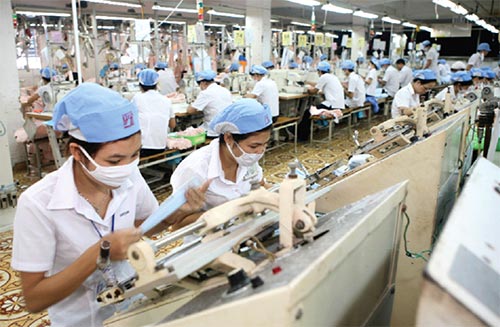Local firms lobby for limits to FDI in garment sector

More foreign investors have set up new textile and garment facilities and expanded their operations in Vietnam
Pham Xuan Hong, chairman of the Ho Chi Minh City Association of Garment, Textile, Embroidery and Knitting (AGTEK) said that in recent years many foreign investors have established new facilities and expanded their operations in Vietnam. However, he urged that they not be allowed to do so in cities and that the Vietnamese government put priority on other chains such as fibre, knitting and supporting industries which are thirsty for technology and capital.
Industrial parks and processing zones in Ho Chi Minh City absorbed nearly $265 million in foreign direct investment (FDI) in the first half of 2014, of which 82 per cent went into the garment and textile sector. In March, Ho Chi Minh City licensed China’s Gain Lucky Limited, a subsidiary of Shenzhou International, to build a $140 million centre for fashion design and garment manufacturing. The company produces garments for brands like Nike, Adidas and Puma.
Also in March, Hong Kong-based Esquel Group opened a $25 million garment plant in the northern province of Hoa Binh. This is the firm’s third facility in Vietnam.
The northern province of Nam Dinh issued an investment certificate to China’s Jiangsu Yulun Textile Group for a $68 million textile, dyeing, and yarn plant at the Bao Minh Industrial Zone.
Besides the new investments, many existing foreign garment firms have increased their investments to expand their activities.
Le Quang Hung, chairman of Saigon Garment Manufacturing Trade Joint Stock Company said the government only should lure higher technology and higher quality fabric, knitting and supporting industries. He expressed his concern that the labour-intensive garment sector focused too much on urban areas, which has made it difficult to find and keep workers.
Last month Ba Ria-Vung Tau suspended further investment into sectors including garments in order to focus on developing hi-tech and environmentally-friendly projects to create higher product value.
While Nam Dinh is still considered the ‘centre’ of Vietnam’s textile industry, it has also announced that it would stop further investments into this sector due to concerns about land and labour.
Economist Le Dang Doanh said that “Whether to limit investment in textiles and garments is a sensitive issue. These garment projects are not hi-tech, but they do create jobs and increase export turnover. The solution is to lure more of them to rural areas by offering incentives.”
What the stars mean:
★ Poor ★ ★ Promising ★★★ Good ★★★★ Very good ★★★★★ Exceptional
Latest News
More News
- US firms deepen energy engagement with Vietnam (February 05, 2026 | 17:23)
- Vietnam records solid FDI performance in January (February 05, 2026 | 17:11)
- Site clearance work launched for Dung Quat refinery upgrade (February 04, 2026 | 18:06)
- Masan High-Tech Materials reports profit: a view from Nui Phao mine (February 04, 2026 | 16:13)
- Hermes joins Long Thanh cargo terminal development (February 04, 2026 | 15:59)
- SCG enhances production and distribution in Vietnam (February 04, 2026 | 08:00)
- UNIVACCO strengthens Asia expansion with Vietnam facility (February 03, 2026 | 08:00)
- Cai Mep Ha Port project wins approval with $1.95bn investment (February 02, 2026 | 16:17)
- Repositioning Vietnam in Asia’s manufacturing race (February 02, 2026 | 16:00)
- Manufacturing growth remains solid in early 2026 (February 02, 2026 | 15:28)
















 Mobile Version
Mobile Version